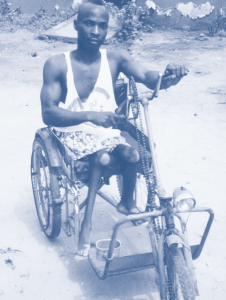Spring 2002 InGear
I had come searching for Akrofi Augustine while visiting the Volta River Estuary community of Ada, home to the Nene Ocansey I Technical Center (NEKOTECH), one of two Pedals for Progress partners in Ghana. Pedals for Progress has shipped four containers of bicycles and parts to NEKOTECH beginning in late 2000, and already there are more than 1,000 PfP-provided bicycles circulating in Ada district.
 Akrofi (“first-born”) lives in Amlakpo, a small village of the Ada district. Amlakpo is four kilometers out of Kasseh, the commercially-active crossroads where traffic parts, continuing eastward across the Volta River towards neighboring Togo, or turning south a few miles down river to Ada proper. Akrofi’s family owned their modest home, and rented the other half of the simple concrete-block duplex to a Peace Corps volunteer. Through this contact we had heard of this energetic young man, who had established a reputation locally for exceptional initiative.
Akrofi (“first-born”) lives in Amlakpo, a small village of the Ada district. Amlakpo is four kilometers out of Kasseh, the commercially-active crossroads where traffic parts, continuing eastward across the Volta River towards neighboring Togo, or turning south a few miles down river to Ada proper. Akrofi’s family owned their modest home, and rented the other half of the simple concrete-block duplex to a Peace Corps volunteer. Through this contact we had heard of this energetic young man, who had established a reputation locally for exceptional initiative.
Akrofi, now 29, told me his story. He had suffered polio at age 2, crippling his legs and leaving them emaciated and useless. Through first grade, he lived with his grandmother, attending school nearby. Crawling to school and elsewhere, Akrofi developed exceptionally strong arm and chest muscles. However, after returning to live with his father, the one-mile distance to the new school eventually compelled him to drop out.
For many years, he stayed close to home, for a while feeling depressed and useless. On reaching his teens and hoping to make a financial contribution to the family, he began to work as a barber. For a while, he persevered, but waiting for people to come to his home to sit for a haircut was frustrating and didn’t generate much income.
His break came when the clinic in Batton, at the behest of his father who worked there, gave him a bicycle-wheelchair put together by a local workshop. The customized contraption, with the drive chain fixed high in front, permitted Akrofi to efficiently apply his brawny arms to moving around independently.
With the freedom provided, he was able to break out of home-bound isolation. Unable to make a living cutting hair at home, Akrofi set about to realize a long-held dream of learning to repair radios and televisions.
A childhood friend was a store owner and established electronics repairman in Kasseh. Akrofi, when not barbering, hung out there, and soon came to think that electronics repair was far more interesting than barbering. It was a career where his disability was not an impediment. When he barbered, it was difficult to cut people’s hair because he couldn’t readily circle around his customer like standing barbers do. With electronics repair, Akrofi could focus on his work at a table, relying on his hands alone.
In the months preceding our January 2002 visit, Akrofi apprenticed himself to the electronics repair shop. In exchange for the proprietor’s time and knowledge, Akrofi works for nothing, slowly acquiring the varied skills to run such a business. In spite of the five-kilometer distance, the young man is a regular sight on the road, outpacing pedestrians and greeting a growing number of acquaintances. Soon, he will be able to leave and begin his own business.
Akrofi is satisfied; he enjoys the challenges and variety of repair work, knows he will earn more money once he is on his own, and looks forward to becoming independent and his own boss. Once he has mastered the trade, he plans on moving near his father in Batton. And all because of a bicycle wheelchair.
